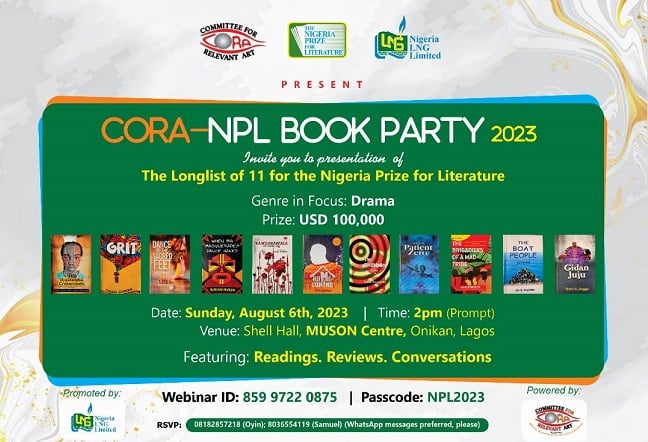The Committee for Relevant Art (CORA) is set to engage eleven writers in the Nigeria Prize for Literature (NLP) book party on August 6.
In a statement on Tuesday, CORA said the book party will take place at the Shell Hall, MUSON Centre, Onikan, Lagos Island.
The event is the 14th edition since the literature-loving Nigerian LNG signed on to the programme to boost its $100,000 prize project.
Samuel Osaze, CORA programme directorate, in a statement, said the submission of 143 entries for the drama genre this year is impressive.
According to him, this shows that “Nigerian writers are indeed very productive, contrary to the impression that the genre is not as popular among creative writers”.
“The demography of the longlisted writers is cross-generational. It is encouraging that young writers are deeply interested in drama,” the statement reads.
“The longlist this year, much like what happened last year when the poet Romeo Oriogun won, consists of old, midcareer, and young writers, who are in contention for the biggest literary prize on the continent and one of the biggest in the world.
“With whopping $100,000 at stake, the 2023 longlist writers comprise: Bode Sowande – a septuagenarian university don whose play ‘The Spellbinder‘ is described by the NPL judges as “a psychological enquiry into cleansing of mental instability having forgiveness at the root of its resolution.
“Abideen Abolaji Ojomu’s ‘The Ojuelegba Crossroads’ is said to take the reader “into a townhall to discuss in an engaging manner a metaphor of a society in dire need of purging.
“Olatunbosun Taofeek’s ‘Where is Patient Zero’ typifies a play full of drama and humour. It is an engagement on international politics of disease and economy.
“‘Grit’ by university teacher and a record fifth-timer on NPL longlist, Obari Gomba, “gives a deep insight into the destructive impact of soul-less politics which brings out the beast in man. The play is filled with conflicts that create the mood of the inevitability of tragedy.
“‘Dance of The Sacred Feet’ by Ade Adeniji is concerned about “upholding the sanity of cultural tradition and yet making space to accommodate change and diversity for peace and progress.
“‘Yamtarawala- The Warrior King’ by Henry Akubuiro, an art journalist whose foray into fictional works has come into reckoning, is described as “a historical play garnished with fascinating tales and rituals.
“Victor Dugga’s ‘Gidan Juju’ dwells on “kingship and succession, revolutionizing tradition and inviting post-modernity.
“Olubunmi Familoni’s ‘When Big Masquerades Dance Naked’ has an “insightful, socio-realistic subject-matter representing the dimension of systemic corruption and criminal alliance in traditional and contemporary political space.
“‘The Boat People’ by Christopher Anyokwu, a lecturer and a second timer on the NPL race, is described by the judges as presenting a “socio-culturally relevant subject-matter that is rich in techniques.
“Those that may be considered to fall within the young writers’ clique include: Cheta Igbokwe and Abuchi Modilim. Igbokwe’s ‘Home Coming’, is captured as “a play that gives profound understanding of tragic experiences and the psychological life of the people.”
“‘The Brigadiers of a Mad Tribe’ by the winner of the 2021 Arojah Students Playwriting Prize, Abuchi Modilim, “is a discourse on the politics of marriage between science and voodoo.”
The list of 11 will be whittled down to a shortlist of three. The winner of the 2023 NPL will be announced in October.
The NPL was inaugurated in 2004 and sponsored by Nigerian LNG Limited with $20, 000 prize money which was later raised to $50,000 and now, it is a $100,000 prize.
Copyright 2025 TheCable. All rights reserved. This material, and other digital content on this website, may not be reproduced, published, broadcast, rewritten or redistributed in whole or in part without prior express written permission from TheCable.
Follow us on twitter @Thecablestyle

